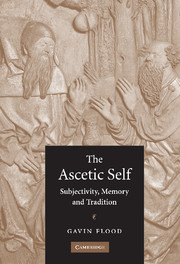9 - The ascetic self and modernity
Published online by Cambridge University Press: 16 November 2009
Summary
Ecstasy creates its own divine landscape; acedia disfigures the landscape, bleeds sap from nature, poisons life with an ennui which only we, accursed mortals, can still comprehend. Modern acedia is no longer monastic solitude – though our souls are our cloisters – but a void, and the dread of an inefficient, derelict God.
E. M. Cioran Tears and SaintsForgetfulness is white, – white as a blasted tree,
And it may stun the sybil into prophecy,
Or bury the Gods.
I can remember much forgetfulness.
Hart Crane ‘Forgetfulness’We have discussed the ascetic self in the histories of three scriptural traditions and presented an argument for shared structures in its formation. It remains for our concluding chapter to place the ascetic self in the context of modernity, both in terms of cultural and social developments and in terms of theory. The location and trope of the ascetic self in cosmological, liturgical traditions has, of course, been significantly eroded over several centuries in the West. The general demise of the ascetic self in modernity as both cultural trope and social fact is linked to the demise of traditional cosmologies, to the rise of the human sciences and Enlightenment reason and to the demise of broader religious tradition with the twofold death of ‘God’ and ‘Man’. The idea of progress that goes beyond medieval Christian theology implies that the ascetic self looking back to before creation and forwards to an eschaton is redundant, merely an echo of the past.
- Type
- Chapter
- Information
- The Ascetic SelfSubjectivity, Memory and Tradition, pp. 235 - 257Publisher: Cambridge University PressPrint publication year: 2004



